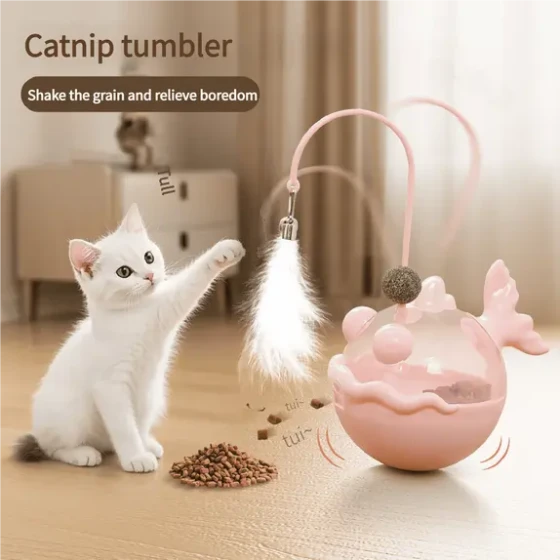Can kittens eat eggs_Scientific feeding guide for kittens eating eggs
Can kittens eat eggs? Scientific feeding guide for kittens eating eggs
For many new cat owners who just got a kitten, figuring out how to provide nutritious and safe food for their little companion is often a puzzling question. We know eggs are rich in protein and have many health benefits for humans, so can lively and adorable kittens also enjoy this delicious and nutritious food? The answer is: cooked eggs, as an occasional treat, are relatively safe for most weaned kittens and can provide some additional nutrition. However, the feeding amount must be very small, and frequency must be limited; raw eggs should be completely avoided.
Kittens need very balanced and specialized nutrition during their growth stage. Their main food source should be high-quality kitten food or veterinarian-recommended specialized cat milk/formula. Eggs can only be a "snack" beyond their regular meals, and must never overshadow the main diet.
Why can kittens eat cooked eggs (in small amounts)?
Eggs, especially cooked eggs, are rich in high-quality protein, various vitamins (such as vitamins A, D, E, and B complex), and minerals (such as iron and selenium). These nutrients have positive effects on kittens’ muscle development, vision, bone health, and overall metabolism.
- High-quality protein: Protein is the foundation for building cats’ body tissues and is crucial for rapidly growing kittens. The protein in eggs is high-quality and easily digestible for cats (provided it is cooked).
- Vitamins and minerals: Egg yolks contain abundant fat-soluble vitamins, benefiting cats' skin, fur, and immune system.
Imagine kitten food as a "main meal set" of rice and dishes, then a small piece of cooked egg is like an occasional "snack reward" after the meal, providing extra nutrition but definitely not replacing the meal.
Raw eggs, a forbidden zone for kittens!
Although small amounts of cooked eggs can be fed, raw eggs pose risks to cats (including kittens and adults) and should be strictly avoided. The main risks are twofold:
- Bacterial contamination: Raw eggs may carry harmful bacteria such as Salmonella or E. coli. While cats’ digestive systems differ from humans', they can still get infected by these bacteria, causing vomiting, diarrhea, fever, or more severe health issues. The risk is especially high for kittens with immature immune systems.
- Avidin (anti-biotin protein): Raw egg whites contain a substance called avidin, which interferes with cats’ absorption of biotin (a B vitamin). Although cats also get biotin from other foods, long-term large amounts of raw egg feeding may cause biotin deficiency, affecting skin health, fur growth, and even nervous system function. However, this risk mainly occurs with prolonged heavy raw egg feeding, and avidin is deactivated by cooking, so cooked eggs have no such issue.
How to feed kittens eggs safely and scientifically?
If you decide to occasionally give your kitten a taste of eggs, please strictly follow these scientific feeding principles:
- Must be cooked: This is the most important point! Fully cook the egg; boiled eggs or plain scrambled eggs without any seasoning are both acceptable. Do not add salt, oil, soy sauce, garlic, ginger, or any common human cooking seasonings, as they can be harmful to cats.
- Small amounts! Small amounts! Small amounts! Important to say three times. Kittens’ digestive systems are very delicate, and even a little new food can cause discomfort. The feeding amount should be very small, such as a pea-sized piece or as small as a fingernail of cooked egg bits. Never give large or excessive portions.
- Low frequency: Eggs should only be an occasional treat, not part of daily diet. Feeding once or twice a week in small amounts is relatively safe. Not feeding at all is also fine, as kitten food already provides all necessary nutrients.
- Observe reactions: After feeding a small amount of cooked egg for the first time, closely monitor your kitten for 24-48 hours for any adverse reactions such as vomiting, diarrhea, loss of appetite, or scratching (which may indicate allergies). If any abnormality appears, stop feeding eggs immediately and consult a vet as needed.
- Crush or dice: Break cooked eggs into small pieces or dice them finely, making it easier for kittens to swallow and digest.
- Suitable for weaned kittens only: Newborn kittens still nursing should not be fed eggs. Only after kittens are fully weaned and accepting solid food should you consider feeding small amounts of eggs under veterinary guidance or ensuring safety. Usually, it is recommended to start after kittens are about two months old and eating kitten food.
Egg white or egg yolk?
Both cooked egg whites and yolks can be fed in small amounts to kittens. Egg whites are mainly protein with low fat; egg yolks contain more fat, vitamins, and minerals. Considering kittens’ digestion, you can start with a little cooked egg white to see if they adapt, and if well tolerated, try small amounts of cooked yolk. But total amount should always be very small.
Frequently Asked Questions (FAQs)
- At what age can kittens eat eggs? It is generally recommended to wait until kittens are two months old, fully weaned, and eating kitten food steadily before offering small amounts of cooked eggs as treats.
- How much egg can be fed at once to a kitten? Very little—about the size of a pea or fingernail of cooked egg pieces.
- How often can kittens be fed eggs? As an occasional treat, feed once or twice a week in small portions.
- What is the difference between raw and cooked eggs? Raw eggs carry bacterial contamination risks and affect biotin absorption and should never be fed. Cooked eggs have much lower risks and can be fed in small amounts.
- What if a kitten has diarrhea after eating eggs? Stop feeding eggs immediately and monitor. If diarrhea persists or other symptoms (vomiting, lethargy) occur, see a vet promptly.
- Can all kittens eat eggs? Not necessarily. Some kittens may be allergic to eggs or have sensitive digestion. If your kitten has known food allergies or digestive issues, consult a vet before feeding eggs.
Summary
Overall, cooked eggs can be an occasional and small nutritious snack for weaned kittens, as they are rich in protein, vitamins, and minerals. The essential principles are "cooked," "small amount," and "occasional". Raw eggs are strictly prohibited. A kitten’s main diet should always be specially formulated, balanced kitten food. Before introducing any new food to your kitten, it is best to consult a professional veterinarian who can provide the most suitable advice based on your kitten’s specific condition. Remember, scientific feeding ensures your little furball grows up healthy and happy!

-560x560.webp)



